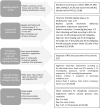The Refeeding Syndrome: a neglected but potentially serious condition for inpatients. A narrative review
- PMID: 33074463
- PMCID: PMC7843537
- DOI: 10.1007/s11739-020-02525-7
The Refeeding Syndrome: a neglected but potentially serious condition for inpatients. A narrative review
Abstract
The Refeeding Syndrome (RFS) is a potentially serious, but still overlooked condition, occurring in individuals who are rapidly fed after a period of severe undernourishment. RFS derives from an abnormal electrolyte and fluid shifts leading to many organ dysfunctions. Symptoms generally appear within 2-5 days of re-feeding and may be absent/mild or severe and life threating, depending on the pre-existing degree of malnutrition and comorbidities. The lack of a standard definition and the nonspecificity of the symptoms make both incidence estimate and diagnosis difficult. In 2020, the American Society for Parenteral and Enteral Nutrition (ASPEN) proposed a unifying definition for the RFS and its severity classification. The awareness of the condition is crucial for identifying patients at risk, preventing its occurrence, and improving the management. The objectives of this narrative review were to summarize the current knowledge and recommendations about the RFS and to provide useful tips to help physicians to recognize and prevent the syndrome.
Keywords: Hypokalemia; Hypomagnesemia; Hypophosphatemia; Malnutrition; Refeeding syndrome; Thiamine.
Conflict of interest statement
The authors declare that they have no conflict of interest.


